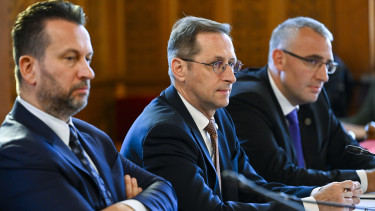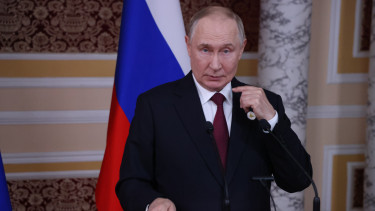The Era of Globalization is Over, the tensions will stay with us for a long time - Nikolaus Lang

Given recent geopolitical conflicts such as the Russia-Ukraine war, the Iran-Israel conflict, and tensions in the Taiwan Strait and Red Sea, what do you think are the next possible geopolitical conflicts in the coming years?
The conflicts you mentioned are just the beginning. There are many other overlooked conflicts, such as those in Sudan, Armenia and Azerbaijan, and the Sahel region.
According to different statistics, there are more than 200 armed or near-armed conflicts globally.
However, the three conflicts you mentioned—the war in Ukraine, the crisis in the Middle East, and the tensions around the South China Sea and Taiwan—remain the single biggest geopolitical risks. These conflicts have military, humanitarian, and potentially nuclear implications, as well as massive macroeconomic impacts..
Many officials and business leaders mention the trade tensions between the United States and China, and the potential for similar tensions between the EU and China. Are these more harmful from an economic perspective than the conflicts in the South China Sea or the Middle East?
Tensions between the EU and China, and the US and China, are indeed more harmful economically, because they are already impacting global trade.
Our projections suggest that an estimated USD 200 billion will be taken out of global trade over the next 10 years due to US-China trade tensions.
This is roughly one-third of the total trade between the two countries. EU-China trade tensions, estimated to cost EUR 50 billion euros over the next three years, are also significant but less impactful in relative terms.
Is the era of globalization coming to an end? What will come next?
Yes, the era of globalization as we knew it since World War II is over.
We are entering a multipolar world. This world is already taking shape and will continue to evolve. On one side, we have the traditional West, which includes the US, Europe, and democratic allies in North America and Asia-Pacific.
This bloc has significantly changed, especially on a military scale, with NATO reawakening after the war in Ukraine. On the other side, we have a new Eastern bloc consisting of Russia, China, North Korea, and Iran, which has grown closer in recent years.
Additionally, there is a third group of countries, such as India, Indonesia, GCC countries, and potentially Brazil, that are trying to maintain equidistance between these blocs and find a third, non-aligned path.
Can countries remain neutral – both in political and economic terms – in this multipolar world?
Being neutral is not impossible, nor is it inherently negative, but it is challenging. And trying to build bridges between blocs is positive. However, the question is whether a country has the political and economic weight to do so effectively.
Historically, neutrality has only been possible when the major blocs agree to it. Today, many countries are part of international groupings like the EU or NATO, which complicates true neutrality.
The transition to a multipolar world has significant implications for global governance and international institutions. International organizations such as the World Bank, the United Nations, and the World Trade Organization (WTO) have all faced challenges in recent years, with the WTO's appellate body being a notable example of an institution that has struggled to function effectively. The global trade outlook is also changing, with projections indicating that global trade will grow at a slower pace than in previous decades.
While global trade is still expected to grow, the rate of growth is significantly lower than it was in the early 2000s, reflecting the fragmentation of the global economic system.
In this new multipolar world, we are likely to see more clear separation in terms of industrial standards, political systems, and tech stacks. The Chinese tech stack, for instance, is completely different from the Western tech stack, with different applications, middleware, and backend systems. This divergence is indicative of a broader trend towards decoupling and the emergence of distinct technological ecosystems.

Is it conceivable that Europe should become a great power in its own right and a new pole? In Brussels, the US-EU relationship is seen as weaker than at any time in the last two decades, but everyone is afraid of our lack of competitiveness.
Europe has its deficiencies, particularly in innovation, energy dependence, and defense maturity. However, it also has significant assets and potential. For instance, Brexit has increased political cohesion within the EU, and Europe has been effective in developing a vaccine response to COVID-19 and supporting Ukraine.
Talking about Ukraine, the best peace we can hope for in is a Korea-style armistice with a demarcation line, but even that will be less stable than the 2014 situation.
Europe has learned the hard way how to replace the more than 100 billion cubic meters of gas that were flowing from Russia annually. While some countries are still dependent, the overall direction is clear.
Europe also needs to rethink its defense strategy. Currently, the combined nuclear arsenal of the UK and France is around 500 warheads, compared to the thousands held by superpowers like the US and Russia. This disparity highlights the need for Europe to invest more in its defense capabilities.
The economic cohesion of the region is often overlooked. For example, Portugal, Spain, Italy, and Greece have added more than USD 200 billion in GDP over the last five years, while Germany added only USD 85 billion.
The EU is imposing new tariffs on Chinese Electric Vehicles (EVs). Will this make Europe stronger or is it a mistake?
Putting tariffs on imports questions the logic of global free trade.
In the specific case of EVs, the average European electric car currently costs between € EUR35,000 and € EUR 40,000, while the cost for a Chinese car like those produced by BYD is around € EUR 20,000. Adding a 20% tariff to the Chinese cars would increase their price by €4,000, but they would still be significantly cheaper than their European counterparts.
This suggests that the tariffs may not be sufficient to level the playing field and could instead lead to higher prices for consumers without significantly boosting the competitiveness of European manufacturers.
Moreover, the focus on tariffs may distract from the underlying issues that are contributing to the competitiveness gap between European and Chinese EV manufacturers. These issues include inefficient processes, high labor costs, and a lack of innovation in the European automotive industry. Addressing these structural problems is likely to be more effective in the long run than relying on tariffs to protect domestic industries.
That being said, there are valid concerns about the impact of Chinese EVs on the European market. Chinese manufacturers have made significant strides in recent years, and their products are becoming increasingly competitive in terms of both price and quality. This poses a challenge to European manufacturers, who may struggle to keep up with the pace of innovation and cost reduction in the Chinese market.
The focus should be on making European cars more competitive and less expensive.
How can Europe compete with China in the EV market, given the disadvantage in the availability of raw materials?
The cost of European electric vehicles is not primarily driven by the lack of raw materials but by the lack of integrated supply chains and inefficient processes within Western companies. European OEMs have cumbersome and costly processes that Chinese startups do not have. For example,
European companies take 50 to 60 months to develop a car, while Chinese companies do it in 28 to 30 months.
First, Europe needs to invest heavily in research and development (R&D) to stay at the forefront of technological innovation. This includes developing new battery technologies, such as solid-state batteries, which have the potential to be more efficient and safer than the lithium-ion batteries currently in use. By focusing on cutting-edge technologies, Europe can differentiate its products and maintain a competitive edge in the global market.
Second, Europe should work to diversify its supply chains and reduce its dependence on Chinese-controlled raw materials. While China has a significant advantage in terms of access to raw materials like lithium and cobalt, Europe can explore alternative sources of supply, such as Africa and South America. Additionally, Europe can invest in recycling technologies to recover valuable materials from used batteries, reducing the need for new raw materials.
Third, Europe needs to address the inefficiencies and high costs associated with its automotive industry. European car manufacturers have cumbersome and costly processes that make it difficult for them to compete with more agile and cost-effective Chinese startups. Streamlining production processes, reducing bureaucracy, and fostering a more entrepreneurial culture within the industry can help European manufacturers become more competitive.
Fourth, Europe should focus on developing a robust ecosystem for EVs, including charging infrastructure, maintenance services, and aftermarket support. By creating a comprehensive and user-friendly ecosystem, Europe can make EVs more attractive to consumers and encourage greater adoption of these vehicles.
Fifth, Europe can leverage its strengths in areas like design, quality, and branding to differentiate its products. European cars are renowned for their high quality and sophisticated design, and these attributes can be a significant selling point in the global market.
Finally, Europe should work to create a more favorable regulatory environment for the EV industry. This includes providing incentives for consumers to purchase EVs, investing in charging infrastructure, and supporting the development of new technologies. Additionally, Europe should work to harmonize its regulatory framework with those of other major markets, such as the United States and China, to facilitate greater cooperation and integration in the global EV market.
The mindset, entrepreneurial spirit, and availability of capital in the US versus Europe also play a role.
Europe needs to embrace new technologies, think through new employment models, and foster a more risk-taking culture.
Would the proposed Capital Markets Union in the EU be enough to compete with the US and China?
One thing we should not forget is the availability of capital in the US vs. Europe. This has to do with the fact that a lot of the pension system in the US is capital market driven. While in Europe, a large portion of the capital of the pension model is public spend based.
Allowing European companies easier access to capital is definitely beneficial. However, the question of whether it is enough is more complex.
How do you see the future of geopolitical conflicts and their impact on global stability?
The future of geopolitical conflicts is likely to be characterized by ongoing instability and a multipolar world with different regions exerting influence. I don't believe that any of the major conflicts we've discussed – whether in the Middle East, Ukraine, or the South China Sea – will be resolved anytime soon. For instance, the conflict between Israel and Hamas is just one in a long series of conflicts that Israel has faced since its creation in 1948. The situation is complex and unlikely to see a quick resolution.
Moreover, the world is experiencing a much stronger feeling of instability. The era of cheap money from the 2010s is unlikely to return, given the continued geopolitical shifts, supply chain shocks, and increased military spending.
Inflation is a real concern, and some reports from international institutions suggest that it could pick up again in 2026. This economic uncertainty adds another layer of complexity to the geopolitical landscape.
In this multipolar world, Europe needs to think strategically about its role and how to navigate the instability. This includes not only bolstering its defense capabilities but also addressing economic challenges and ensuring energy security. These conflicts will stay with us for a long time.
The message to CEOs and policymakers is clear: they must continuously think about a world that is fundamentally unstable and prepare for the challenges that come with it through adaptation and strategic thinking.
Cover photo: BCG
A cikk elkészítésében a magyar nyelvre optimalizált Alrite online diktáló és videó feliratozó alkalmazás támogatta a munkánkat.






